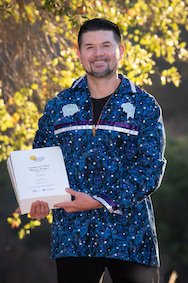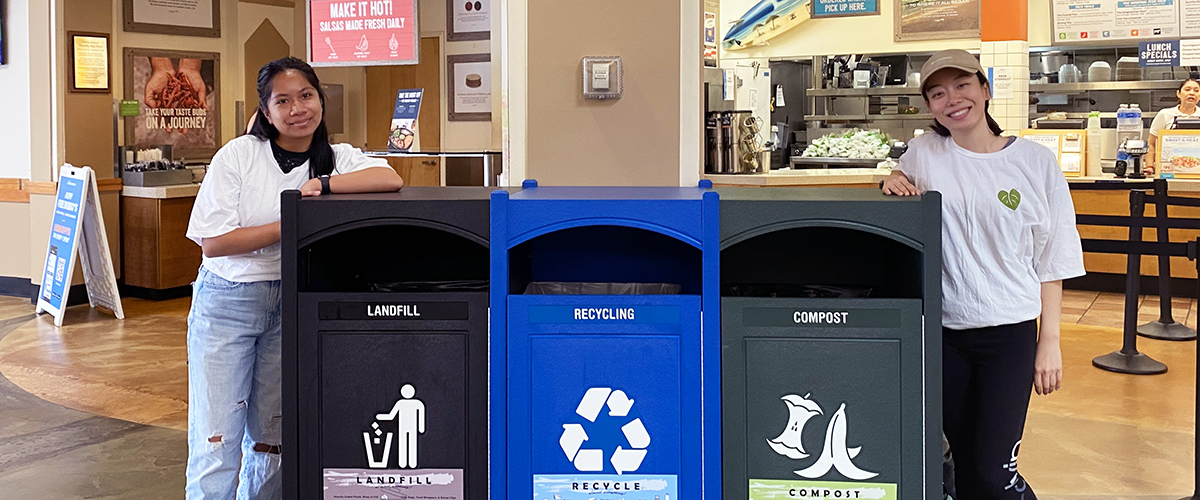Ethan Banegas

Ethan Banegas, a descendant of the Kumeyaay, Luiseño-Payómkawichum, and Cupeño- Kuupangaxwichem bands of Native Americans, grew up on the Barona Reservation in San Diego County. He currently works as a Professor at San Diego State University teaching multiple courses on American Indian Studies along with serving as the co-owner of Kumeyaay.com and Historian for the San Diego History Center. Recently the Office of Energy and Sustainability met with Banegas to discuss sustainability from a Native perspective.
Barona Reservation in San Diego, like all other reservations, does not fall under state regulations. Tribes may allow mining, dump sites, etc. on their land with no government approval since it is privately governed land. Before speaking with Banegas, one would have thought that the lack of state and EPA regulations would cause worse environmental actions on the reservation due to no regulation by the state. That said, due to the cultural and historical significance of land to Native Americans they tend to be more environmentally friendly than state territory- declining investors looking to mine, dump, etc. on their land. Land and natural resources are considered Holy to natives, the idea of living among resources and land rather than exploiting them has heavily benefited the preservation of reservations.
Despite many private investment inquiries to use native land for things like mining, groups like the Kumeyaay have stuck with their values and continue to deny outside investors. Banegas stated “In terms of any project we plan- if it compromises our land, we will always rule in favor of preservation. Indian people say no more than we say yes, most reasoning drawing back to our land preservation”. As younger generations rise, Natives have become more and more eco-centric. The local Campo tribe has shown just this when private investors inquired about building a dump on their reservation. “The band says younger members who have come of age since the project was first proposed in the 1980s are against it for environmental reasons. It also says it has economic opportunities it didn’t have then, and its members believe the project isn’t worth it. The tribe has opened a casino and built a wind farm in the intervening years and is in the process of developing a second wind farm.”(Soto, Campo Tribe). With new alternatives to fund their economy along with the growth in the environmental movement, Natives have steered away from exploitative investors.
Many tribes like the Kumeyaay have created a self-sufficient economy that functions without exploitation and outside investors. The introduction of gaming has drastically helped these groups bring in revenue, without it they would have to rely on private investors who have a history of exploiting and belittling land due to the lack of state regulation on reservations. Banegas shared that using these new funds, casinos like Barona have implemented more sustainable practices. Barona has built rain-catching tanks and developed water recycling methods throughout the hotel, using this water to water their golf course along with landscaping.
Native American studies is a relatively new field. Similar to sustainability, it has not been a largely broadcast and recognized topic. What individuals fail to realize is that these subjects are fundamental to everything in our society. As we fall deeper into climate change, the spotlight will be focused on many anthropogenic topics. Individuals will add more to these fields and make an impact as they go.
As residents of San Diego, we all have a lot to learn from our local reservations and tribes like Barona and the Kumeyaay. Societies can economically function without the exploitation of land and resources. Life is ever-changing, and climate change is alarming, but we must adapt and find models like Native cultures, to create a more healthful and cohesive society.
References
Kumeyaay - Native American News - Kumeyaay Tribes - Kumeyaay Indians - Kumeyaay News https://www.kumeyaay.com/
Soto, Onell R. 2010. “Campo tribe junking dump project - The San Diego Union-Tribune.” https://www.sandiegouniontribune.com/sdut-campo-tribe-junking-dump-project-2010jun02-story.html
Ethan Banegas, [email protected]

